 Tìm kiếm
Tìm kiếm
Chương VIII Luật giáo dục 2019: Quản lý nhà nước về giáo dục
| Số hiệu: | 43/2019/QH14 | Loại văn bản: | Luật |
| Nơi ban hành: | Quốc hội | Người ký: | Nguyễn Thị Kim Ngân |
| Ngày ban hành: | 14/06/2019 | Ngày hiệu lực: | 01/07/2020 |
| Ngày công báo: | 20/07/2019 | Số công báo: | Từ số 569 đến số 570 |
| Lĩnh vực: | Giáo dục | Tình trạng: | Còn hiệu lực |
TÓM TẮT VĂN BẢN
Văn bản tiếng việt
Văn bản tiếng anh
1. Xây dựng và chỉ đạo thực hiện chiến lược, quy hoạch, kế hoạch, chính sách phát triển giáo dục.
2. Ban hành và tổ chức thực hiện văn bản quy phạm pháp luật về giáo dục; ban hành điều lệ nhà trường, chuẩn cơ sở giáo dục, quy chế tổ chức và hoạt động của cơ sở giáo dục, điều lệ ban đại diện cha mẹ học sinh; quy định hoạt động dạy học và giáo dục trong nhà trường và ngoài nhà trường; quy định về đánh giá kết quả học tập và rèn luyện; khen thưởng và kỷ luật đối với người học.
3. Quy định tiêu chuẩn chức danh, chế độ làm việc của nhà giáo và cán bộ quản lý giáo dục; danh mục khung vị trí việc làm và định mức số lượng người làm việc trong các cơ sở giáo dục; tiêu chuẩn người đứng đầu, cấp phó của người đứng đầu các cơ sở giáo dục; tiêu chuẩn chức danh người đứng đầu, cấp phó của người đứng đầu cơ quan chuyên môn về giáo dục thuộc Ủy ban nhân dân cấp tỉnh, cấp huyện; chuẩn nghề nghiệp nhà giáo; ban hành quy tắc ứng xử của nhà giáo, của cơ sở giáo dục; quy định về điều kiện, tiêu chuẩn và hình thức tuyển dụng giáo viên.
4. Quy định mục tiêu, chương trình, nội dung giáo dục; khung trình độ quốc gia; tiêu chuẩn nhà giáo; tiêu chuẩn, định mức sử dụng cơ sở vật chất, thư viện và thiết bị trường học; việc biên soạn, sử dụng sách giáo khoa, giáo trình; việc thi, kiểm tra, tuyển sinh, liên kết đào tạo và quản lý văn bằng, chứng chỉ; việc công nhận văn bằng do cơ sở giáo dục nước ngoài cấp được sử dụng tại Việt Nam.
5. Quy định về đánh giá chất lượng giáo dục; tổ chức, quản lý việc bảo đảm chất lượng giáo dục và kiểm định chất lượng giáo dục.
6. Thực hiện công tác thống kê, thông tin về tổ chức và hoạt động giáo dục.
7. Tổ chức bộ máy quản lý giáo dục.
8. Tổ chức, chỉ đạo việc đào tạo, bồi dưỡng, quản lý nhà giáo và cán bộ quản lý giáo dục.
9. Huy động, quản lý, sử dụng các nguồn lực để phát triển sự nghiệp giáo dục.
10. Tổ chức, quản lý công tác nghiên cứu, ứng dụng khoa học, công nghệ trong lĩnh vực giáo dục.
11. Tổ chức, quản lý công tác hợp tác quốc tế, đầu tư của nước ngoài về giáo dục.
12. Thanh tra, kiểm tra việc chấp hành pháp luật về giáo dục; giải quyết khiếu nại, tố cáo, khen thưởng, xử lý vi phạm pháp luật trong giáo dục.
1. Chính phủ thống nhất quản lý nhà nước về giáo dục.
Chính phủ trình Quốc hội trước khi quyết định chủ trương lớn có ảnh hưởng đến quyền và nghĩa vụ học tập của công dân trong phạm vi cả nước, chủ trương về cải cách nội dung chương trình của một cấp học; hằng năm, báo cáo Quốc hội về hoạt động giáo dục và việc thực hiện ngân sách giáo dục; trình Ủy ban Thường vụ Quốc hội trước khi quyết định việc áp dụng đại trà đối với chính sách mới trong giáo dục đã được thí điểm thành công mà việc áp dụng đại trà sẽ ảnh hưởng đến quyền và nghĩa vụ học tập của công dân trong phạm vi cả nước.
2. Bộ Giáo dục và Đào tạo chịu trách nhiệm trước Chính phủ thực hiện quản lý nhà nước về giáo dục mầm non, giáo dục phổ thông, giáo dục đại học, trung cấp sư phạm, cao đẳng sư phạm, giáo dục thường xuyên.
3. Bộ Lao động - Thương binh và Xã hội chịu trách nhiệm trước Chính phủ thực hiện quản lý nhà nước về giáo dục nghề nghiệp, trừ trung cấp sư phạm, cao đẳng sư phạm.
4. Bộ, cơ quan ngang Bộ, trong phạm vi nhiệm vụ, quyền hạn của mình, có trách nhiệm phối hợp với Bộ Giáo dục và Đào tạo, Bộ Lao động - Thương binh và Xã hội thực hiện quản lý nhà nước về giáo dục.
5. Ủy ban nhân dân các cấp thực hiện quản lý nhà nước về giáo dục theo phân cấp của Chính phủ, trong phạm vi nhiệm vụ, quyền hạn của mình, thực hiện các nhiệm vụ sau đây:
a) Kiểm tra việc chấp hành pháp luật về giáo dục của cơ sở giáo dục trên địa bàn;
b) Bảo đảm các điều kiện về đội ngũ nhà giáo, tài chính, cơ sở vật chất, thư viện và thiết bị dạy học của trường công lập thuộc phạm vi quản lý;
c) Phát triển các loại hình nhà trường, thực hiện xã hội hóa giáo dục; bảo đảm đáp ứng yêu cầu mở rộng quy mô, nâng cao chất lượng và hiệu quả giáo dục tại địa phương;
d) Thực hiện chủ trương, chính sách của Nhà nước và chính sách của địa phương để bảo đảm quyền tự chủ, trách nhiệm giải trình về thực hiện nhiệm vụ và chất lượng giáo dục của cơ sở giáo dục thuộc phạm vi quản lý;
đ) Chịu trách nhiệm về kết quả thực hiện chiến lược, quy hoạch, kế hoạch, chính sách phát triển giáo dục tại địa phương.
Nhà nước mở rộng, phát triển hợp tác quốc tế về giáo dục theo nguyên tắc tôn trọng độc lập, chủ quyền quốc gia, bình đẳng và các bên cùng có lợi.
1. Nhà nước khuyến khích và tạo điều kiện cho cơ sở giáo dục của Việt Nam hợp tác với tổ chức, cá nhân nước ngoài, người Việt Nam định cư ở nước ngoài trong giảng dạy, học tập và nghiên cứu khoa học.
2. Nhà nước khuyến khích và tạo điều kiện cho công dân Việt Nam ra nước ngoài giảng dạy, học tập, nghiên cứu khoa học và trao đổi học thuật theo hình thức tự túc hoặc bằng kinh phí do tổ chức, cá nhân trong nước cấp hoặc do tổ chức, cá nhân nước ngoài tài trợ.
3. Nhà nước dành ngân sách cử người đủ tiêu chuẩn về phẩm chất, đạo đức và trình độ đi học tập, nghiên cứu ở nước ngoài về những ngành, nghề và lĩnh vực then chốt để phục vụ cho sự nghiệp xây dựng và bảo vệ Tổ quốc.
4. Chính phủ quy định việc công dân Việt Nam ra nước ngoài giảng dạy, học tập, nghiên cứu khoa học và trao đổi học thuật; việc hợp tác về giáo dục với tổ chức, cá nhân nước ngoài và người Việt Nam định cư ở nước ngoài.
1. Tổ chức, cá nhân nước ngoài, tổ chức quốc tế, người Việt Nam định cư ở nước ngoài được Nhà nước khuyến khích, tạo điều kiện để giảng dạy, học tập, đầu tư, tài trợ, hợp tác, nghiên cứu khoa học, ứng dụng và chuyển giao công nghệ về giáo dục tại Việt Nam; được bảo hộ các quyền, lợi ích hợp pháp theo pháp luật Việt Nam và điều ước quốc tế mà nước Cộng hòa xã hội chủ nghĩa Việt Nam là thành viên.
2. Hợp tác về giáo dục với Việt Nam phải bảo đảm giáo dục người học về nhân cách, phẩm chất và năng lực công dân; tôn trọng bản sắc văn hóa dân tộc; thực hiện mục tiêu giáo dục, yêu cầu về nội dung, phương pháp giáo dục phù hợp với mỗi cấp học, trình độ đào tạo trong hệ thống giáo dục quốc dân; hoạt động giáo dục phù hợp với quy định của pháp luật Việt Nam.
3. Các hình thức hợp tác, đầu tư của nước ngoài về giáo dục tại Việt Nam bao gồm:
a) Liên kết giáo dục, đào tạo;
b) Thành lập văn phòng đại diện;
c) Thành lập phân hiệu;
d) Thành lập cơ sở giáo dục;
đ) Các hình thức hợp tác, đầu tư khác.
4. Chính phủ quy định chi tiết Điều này.
1. Văn bằng do cơ sở giáo dục nước ngoài cấp được công nhận để sử dụng tại Việt Nam trong trường hợp sau đây:
a) Văn bằng do cơ sở giáo dục phổ thông, cơ sở giáo dục đại học ở nước ngoài cấp cho người học sau khi hoàn thành chương trình giáo dục bảo đảm chất lượng theo quy định của nước cấp bằng và được cơ quan có thẩm quyền về giáo dục của nước đó công nhận;
b) Văn bằng do cơ sở giáo dục nước ngoài đang hoạt động hợp pháp tại nước khác nơi cơ sở giáo dục đặt trụ sở chính cấp cho người học, được cơ quan có thẩm quyền về giáo dục của 02 nước cho phép mở phân hiệu hoặc thực hiện hợp tác, liên kết đào tạo và đáp ứng quy định tại điểm a khoản này;
c) Văn bằng do cơ sở giáo dục nước ngoài hoạt động hợp pháp tại Việt Nam cấp, thực hiện hoạt động giáo dục theo quy định về hợp tác, đầu tư về giáo dục do Chính phủ ban hành, theo phê duyệt của cơ quan có thẩm quyền và đáp ứng quy định tại điểm a khoản này.
2. Bộ trưởng Bộ Giáo dục và Đào tạo, trong phạm vi nhiệm vụ, quyền hạn của mình, ký thỏa thuận quốc tế về tương đương văn bằng hoặc công nhận lẫn nhau về văn bằng; quy định chi tiết điều kiện, trình tự, thủ tục, thẩm quyền công nhận văn bằng; cung cấp thông tin về cơ sở giáo dục đại học bảo đảm chất lượng được nước sở tại công nhận.
Việc công nhận văn bằng giáo dục nghề nghiệp do nước ngoài cấp thực hiện theo quy định của Luật Giáo dục nghề nghiệp.
1. Mục tiêu kiểm định chất lượng giáo dục được quy định như sau:
a) Bảo đảm và nâng cao chất lượng giáo dục;
b) Xác nhận mức độ đáp ứng mục tiêu của cơ sở giáo dục hoặc chương trình đào tạo trong từng giai đoạn;
c) Làm căn cứ để cơ sở giáo dục giải trình với chủ sở hữu, cơ quan nhà nước có thẩm quyền, các bên liên quan và xã hội về thực trạng chất lượng giáo dục;
d) Làm cơ sở cho người học lựa chọn cơ sở giáo dục, chương trình đào tạo, cho nhà tuyển dụng lao động tuyển chọn nhân lực.
2. Việc kiểm định chất lượng giáo dục phải bảo đảm các nguyên tắc sau đây:
a) Độc lập, khách quan, đúng pháp luật;
b) Trung thực, công khai, minh bạch;
c) Bình đẳng, bắt buộc, định kỳ.
3. Đối tượng kiểm định chất lượng giáo dục bao gồm:
a) Cơ sở giáo dục đối với giáo dục mầm non, giáo dục phổ thông và giáo dục thường xuyên;
b) Cơ sở giáo dục và chương trình đào tạo các trình độ đối với giáo dục nghề nghiệp và giáo dục đại học.
1. Ban hành quy định về tiêu chuẩn đánh giá chất lượng giáo dục; quy trình và chu kỳ kiểm định chất lượng giáo dục ở từng cấp học, trình độ đào tạo; nguyên tắc hoạt động, điều kiện và tiêu chuẩn của tổ chức, cá nhân hoạt động kiểm định chất lượng giáo dục; cấp phép hoạt động kiểm định chất lượng giáo dục; cấp, thu hồi giấy chứng nhận kiểm định chất lượng giáo dục.
2. Quản lý hoạt động kiểm định chương trình đào tạo và kiểm định cơ sở giáo dục.
3. Hướng dẫn các tổ chức, cá nhân và cơ sở giáo dục thực hiện đánh giá, kiểm định chất lượng giáo dục.
4. Kiểm tra, đánh giá việc thực hiện quy định về kiểm định chất lượng giáo dục.
1. Tổ chức kiểm định chất lượng giáo dục bao gồm:
a) Tổ chức kiểm định chất lượng giáo dục do Nhà nước thành lập;
b) Tổ chức kiểm định chất lượng giáo dục do tổ chức, cá nhân trong nước, nước ngoài thành lập;
c) Tổ chức kiểm định chất lượng giáo dục nước ngoài.
2. Việc tổ chức thực hiện kiểm định chất lượng giáo dục được quy định như sau:
a) Chính phủ quy định điều kiện, thủ tục thành lập, cho phép hoạt động, đình chỉ, giải thể tổ chức kiểm định chất lượng giáo dục; quy định điều kiện và thủ tục để tổ chức kiểm định chất lượng giáo dục nước ngoài được công nhận hoạt động tại Việt Nam;
b) Bộ trưởng Bộ Giáo dục và Đào tạo quyết định thành lập hoặc cho phép thành lập, cho phép hoạt động, đình chỉ hoạt động, giải thể tổ chức kiểm định chất lượng giáo dục và quy định trách nhiệm, quyền hạn của tổ chức kiểm định chất lượng giáo dục đối với giáo dục mầm non, giáo dục phổ thông và giáo dục thường xuyên; quyết định công nhận, thu hồi quyết định công nhận tổ chức kiểm định chất lượng giáo dục nước ngoài hoạt động tại Việt Nam; quy định việc giám sát, đánh giá tổ chức kiểm định chất lượng giáo dục;
c) Kiểm định chất lượng giáo dục đối với giáo dục nghề nghiệp, giáo dục đại học thực hiện theo quy định của Luật Giáo dục nghề nghiệp và Luật Giáo dục đại học.
STATE MANAGEMENT OF EDUCATION
Section 1. CONTENTS OF STATE MANAGEMENT OF EDUCATION AND STATE AGENCIES IN CHARGE OF MANAGEMENT OF EDUCATION
Article 104. Contents of state management of education
1. Formulating and directing the implementation of strategies, plans and policies of educational development.
2. Promulgating and organizing the execution of legislative documents on education; promulgating school charters, standards of educational institutions, organisational and operational regulations of educational institutions, charters of representative committee of students’ parents; regulations on in-school and out-of-school teaching and educating activities; regulations on assessment of study and training results; awarding and discipline for learners.
3. Defining standards of titles, working principles of teachers and education managers, job category framework and staff quota in educational institutions; standards of heads, deputy heads of educational institutions; standards of heads, deputy heads of educational specialized agencies under the management of provincial/communal People’s Committees; professional standards of teachers; promulgating codes of conduct for teachers, for educational institutions; requirements on conditions, standards and forms of recruitment of teachers.
4. Defining objectives, programmes and contents of education; the Vietnamese Qualifications Framework; teacher standards; standards and usage quota of school infrastructure and equipment; compilation, publication and use of textbooks and syllabi; examination, testing, admission, joint training and management of degrees/diplomas and certificates; recognition of degrees/diplomas issued by foreign educational institutions for use in Vietnam.
5. Stipulating the evaluation of education quality; organizing and managing education quality assurance and accreditation.
6. Conducting statistical and informing work on educational organisation and operation.
7. Organizing educational management apparatus.
8. Organizing and directing the training, upgrading and management of teachers and education managers.
9. Mobilizing, managing and utilizing resources for educational development.
10. Organizing, managing scientific and technological research and application in the education sector.
11. Organizing and managing international cooperation and foreign investment in education.
12. Inspecting, supervising education regulatory compliance; settlement of complaints, denunciations and handling of law violations in education.
Article 105. Education authorities
1. The Government shall exercise the unified state management of education.
The Government shall consult the National Assembly on major guidelines that may affect learning rights and duties of citizens nation-wide, guidelines on reform of educational contents related to a whole educational level; annually report to the National Assembly on educational operation and educational budgetary execution; consult the Standing Committee of the National Assembly on large-scale application of new educational policies that have been successfully piloted when such application may affect learning rights and duties of citizens nation-wide.
2. The Ministry of Education and Training is accountable to the Government for the implementation of state management of preschool education, general education, higher education, vocational secondary education in pedagogy, pedagogical colleges and continuing education.
3. The Ministry of Labour – War Invalids and Social Affairs is accountable to the Government for the implementation of state management of vocational education, except for pedagogical vocational secondary education and colleges.
4. Within the scope of their duties and authorities, other ministries and ministerial-level agencies shall be responsible for cooperating with the Ministry of Education and Training, Ministry of Labour – War Invalids and Social Affairs to exercise the state management of education.
5. The People's Committees of all levels shall implement state management of education according to the Government's delegation and, within the scope of their duties and authorities, shall perform the following duties:
a) Reviewing the education regulatory compliance of local educational institutions;
b) Ensuring conditions concerning teachers, finance, infrastructure, libraries and teaching equipment of public institutions under their management;
c) Developing school types, conducting private sector involvement in education; meeting the demands of scale expansion, improvement of education quality and efficiency in their localities;
d) Implementing State guidelines, policies and local policies to ensure autonomy and accountability for the fulfilment of duties and education quality of educational institutions under their management;
dd) Be responsible for the results of the implementation of strategies, plans and policies on educational development at localities.
Section 2. INTERNATIONAL COOPERATION IN EDUCATION
Article 106. Principles of international cooperation in education
The State shall expand and develop international cooperation in education on the principles of respect for national independence and sovereignty, equality and mutual benefit of all parties.
Article 107. Cooperation in education with other countries
1. The State shall encourage and enable Vietnamese educational institutions to cooperate with foreign organisations, individuals, and overseas residing Vietnamese in teaching, learning and scientific research.
2. The State shall encourage and enable Vietnamese citizens to participate in teaching, studying, research and academic exchange abroad, either at their own expenses or by funding from domestic or foreign organisations/individuals.
3. The State shall set aside its budget to send persons meeting criteria in dignity, morals and qualifications to study and/or conduct research abroad in key areas, jobs and fields so as to serve the construction and defense of the Fatherland.
4. The State shall stipulate the act of Vietnamese citizens teaching, studying, conducting research and/or academic exchange abroad; educational cooperation with foreign organisations, individuals, and overseas residing Vietnamese.
Article 108. Foreign cooperation and investment in education
1. The State shall encourage and enable foreign organisations and individuals, international organisations, overseas residing Vietnamese to conduct teaching, studying, investment, sponsorship, cooperation, scientific research, application and transfer of educational technology in Vietnam; protect legitimate rights and benefits as prescribed in Vietnamese law and international conventions signed or acceded by the Socialist Republic of Vietnam.
2. Educational cooperation with Vietnam must ensure that learners are educated in personality, civic competence and qualification; honor the national cultural identity; ensure that educational objectives, requirements on educational contents, methods are suitable with each educational level and training qualification in the national educational system; ensure educational operation is in compliance with Vietnamese law.
3. Types of foreign educational cooperation and investment in Vietnam include:
a) Joint education and training;
b) Establishment of representative offices;
c) Establishment of branches/campuses of educational institutions;
d) Establishment of educational institutions;
dd) Other types of cooperation and investment.
4. The Government shall provide for this Article.
Article 109. Recognition of foreign degrees/diplomas
1. A degree/diploma issued by a foreign educational institution will be recognised for use in Vietnam in the following cases:
a) It is issued to learners of a foreign general education or higher education institution upon completion of an accredited educational programme of the issuing country and recognised by an education authority of that country;
b) It is issued by a foreign educational institution which is operating legally in another country beside the country where its headquarters are located and permitted by education authorities of both countries to establish branches/campuses or conduct joint training, and meets regulations in point a of this clause;
c) It is issued by a foreign educational institution which is operating legally in Vietnam and conducting educational operation in accordance with the Government’s regulations on educational cooperation and investment and on approval of a competent authority, and meets regulations in point a of this clause.
2. Within the scope of their duties and authorities, the Minister of Education and Training shall sign international agreements on the equivalence or mutual recognition of degrees/diplomas; elaborate conditions, order, procedure and authority of degree/diploma recognition; provide information on accredited higher education institutions recognised by host countries.
Recognition of foreign vocational degrees/diplomas shall comply with the Law on Vocational education.
Section 3. ACCREDITATION OF EDUCATION QUALITY
Article 110. Objectives, regulations and subjects of accreditation of education quality
1. Objectives of accreditation of education quality are regulated as follows:
a) Ensure and improve education quality;
b) Verify the level of achieving educational objectives of educational institutions or training programmes in each period of time;
c) Serve as the basis for educational institutions to explain to owners, competent authorities, relevant parties and the society about the state of education quality;
d) Serve as the basis for learners to choose educational institutions, training programmes, for recruiters to employ workforce.
2. Accreditation of education quality must be:
a) Independent, objective, legitimate;
b) Honest, public, transparent;
c) Equal, compulsory, periodic.
3. Subjects of education quality accreditation include:
a) Institutions of preschool education, general education and continuing education;
b) Educational institutions and training programmes of all qualifications of vocational education and higher education.
Article 111. Contents of state management of education quality accreditation
1. Promulgating provisions on standards of education quality evaluation; procedure and schedule of education quality accreditation at each educational level/training qualification; operating regulations, conditions and standards of accrediting organisations and individuals; granting permits for operations of education quality accreditation; granting and revoking certificates of education quality accreditation.
2. Managing activities of accreditation of training programmes and educational institutions.
3. Instructing organisations, individuals and educational institutions on conducting evaluation and accreditation of education quality.
4. Reviewing, evaluating the implementation of regulations on education quality accreditation.
Article 112. Education quality accreditation organisations.
1. Education quality accreditation organisations (hereinafter referred to as “accrediting organisations”) include:
a) Accrediting organisations established by the State;
b) Accrediting organisations established by domestic and foreign organisations and individuals;
c) Foreign accrediting organisations.
2. The implementation of education quality accreditation is regulated as follows:
a) The Government shall provide for conditions and procedure of establishment, operating permits, suspension, dissolution of accrediting organisations; on conditions and procedure for accrediting organisations to be recognised in Vietnam;
b) The Minister of Education and Training shall make decisions on establishment or establishment permission, suspension of operation, dissolution of institutions of education quality accreditation; stipulate responsibilities, powers of institutions of education quality accreditation for preschool education, general education and continuing education; issue or revoke recognition decisions of institutions of education quality accreditation operating in Vietnam; stipulate supervision and evaluation of institutions of education quality accreditation;
c) Education quality accreditation for vocational education and higher education shall comply with provisions of the Law on Vocational education and Law on Higher education.
Cập nhật
Bài viết liên quan
Mẫu đơn xin nhập học Đại học mới nhất 2025
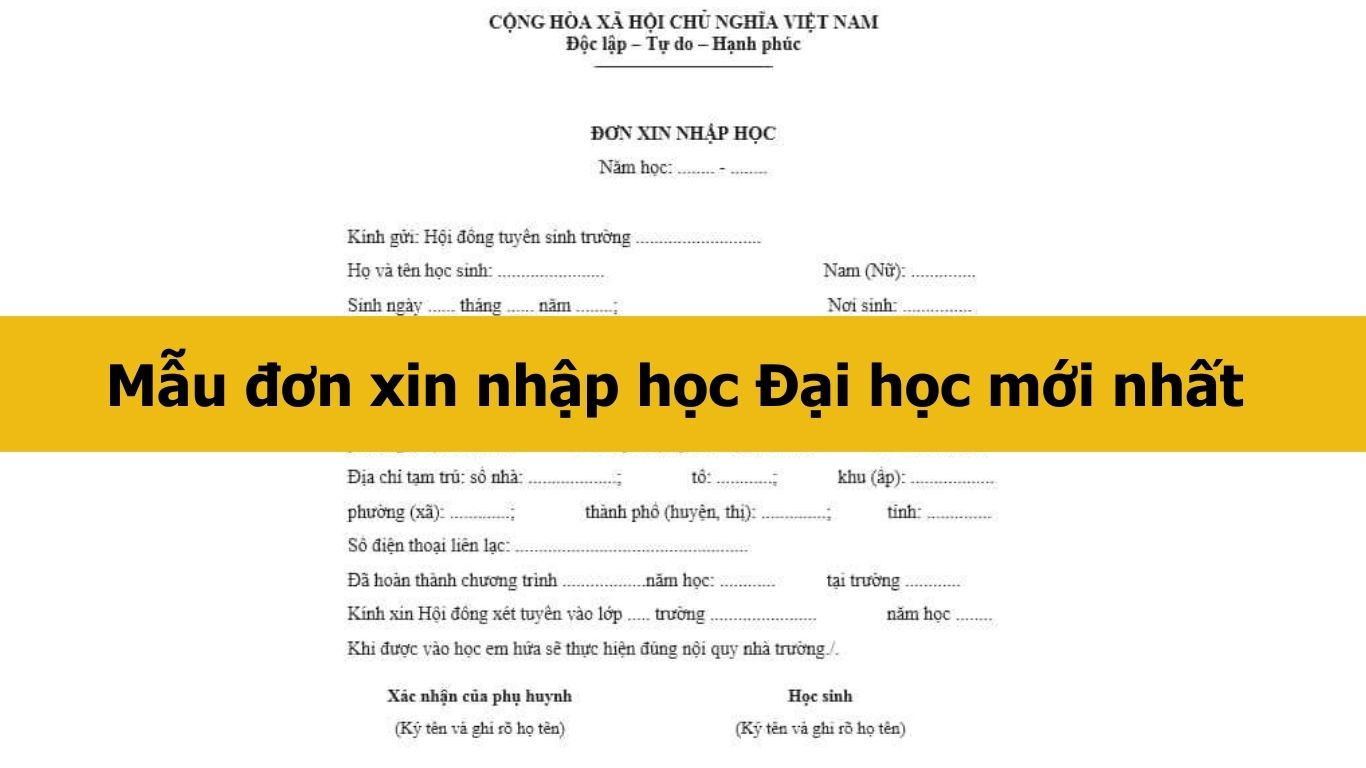
Mẫu đơn xin nhập học Đại học mới nhất 2025
Hiện nay, để chuyển đổi cấp học Đại học trong hệ thống giáo dục Việt Nam thì ngoài các tiêu chuẩn về trình độ, nhận thức còn có một thủ tục trước khi nhập vào cấp học này là phải có đơn xin nhập học. Nhiều phụ huynh còn phân vân chưa biết sử dụng mẫu đơn xin nhập học nào cho đúng. Qua bài viết này, chúng tôi sẽ giúp các bạn có được các mẫu đơn xin nhập học Đại học mới nhất và cách viết phù hợp. 20/01/2025Mẫu đơn xin nhập học THPT mới nhất 2025
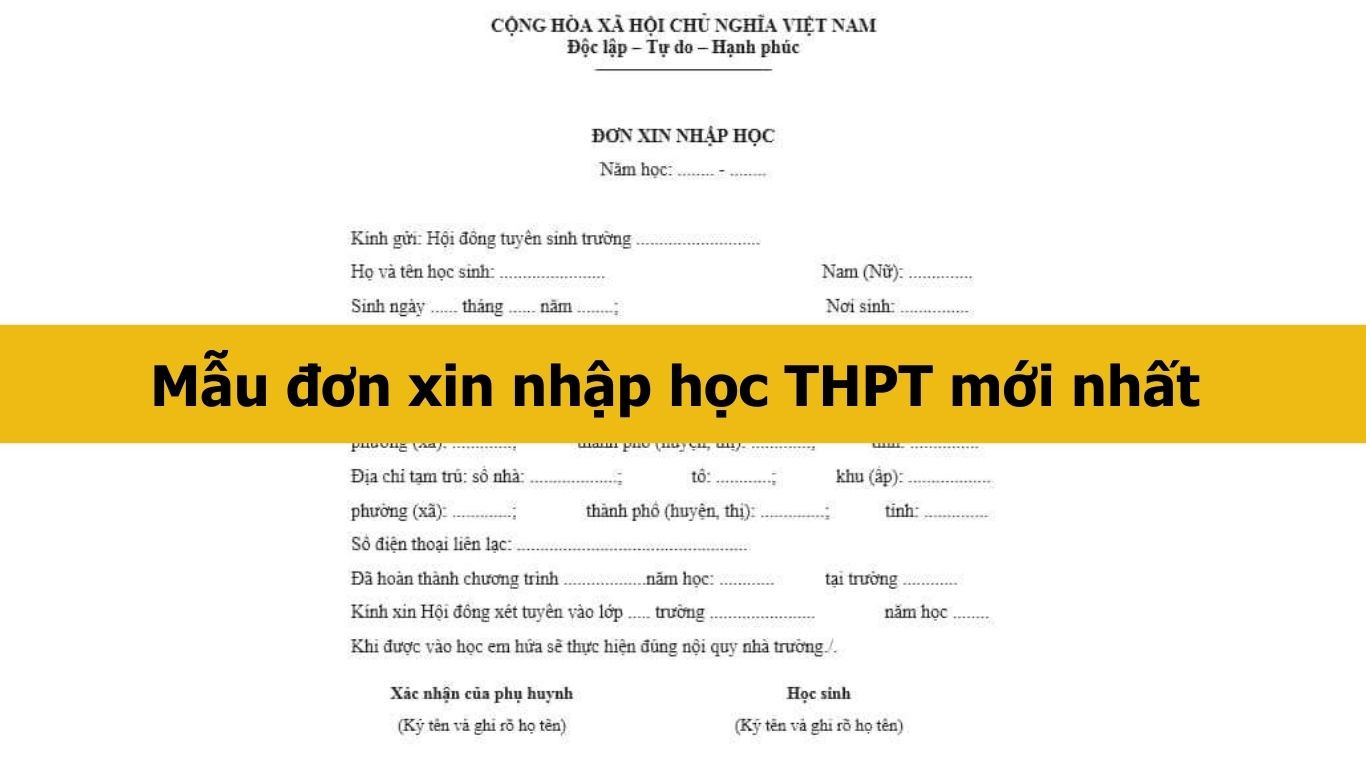
Mẫu đơn xin nhập học THPT mới nhất 2025
Hiện nay, để chuyển đổi cấp học THPT trong hệ thống giáo dục Việt Nam thì ngoài các tiêu chuẩn về trình độ, nhận thức còn có một thủ tục trước khi nhập vào cấp học này là phải có đơn xin nhập học. Nhiều phụ huynh còn phân vân chưa biết sử dụng mẫu đơn xin nhập học nào cho đúng. Qua bài viết này, chúng tôi sẽ giúp các bạn có được các mẫu đơn xin nhập học THPT mới nhất và cách viết phù hợp. 20/01/2025Mẫu đơn xin nhập học THCS mới nhất 2025
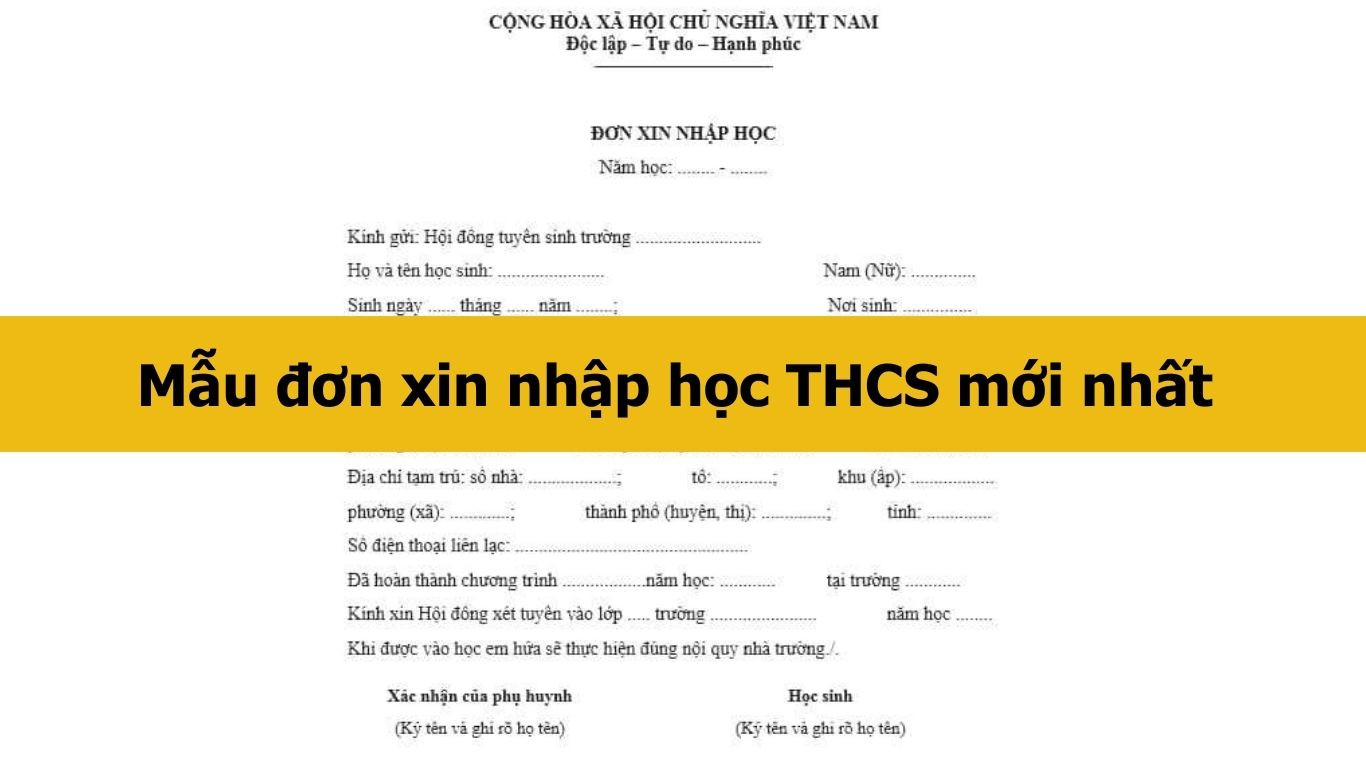
Mẫu đơn xin nhập học THCS mới nhất 2025
Hiện nay, để chuyển đổi cấp học THCS trong hệ thống giáo dục Việt Nam thì ngoài các tiêu chuẩn về trình độ, nhận thức còn có một thủ tục trước khi nhập vào cấp học này là phải có đơn xin nhập học. Nhiều phụ huynh còn phân vân chưa biết sử dụng mẫu đơn xin nhập học nào cho đúng. Qua bài viết này, chúng tôi sẽ giúp các bạn có được các mẫu đơn xin nhập học THCS mới nhất và cách viết phù hợp. 20/01/2025Mẫu đơn xin nhập học tiểu học mới nhất 2025
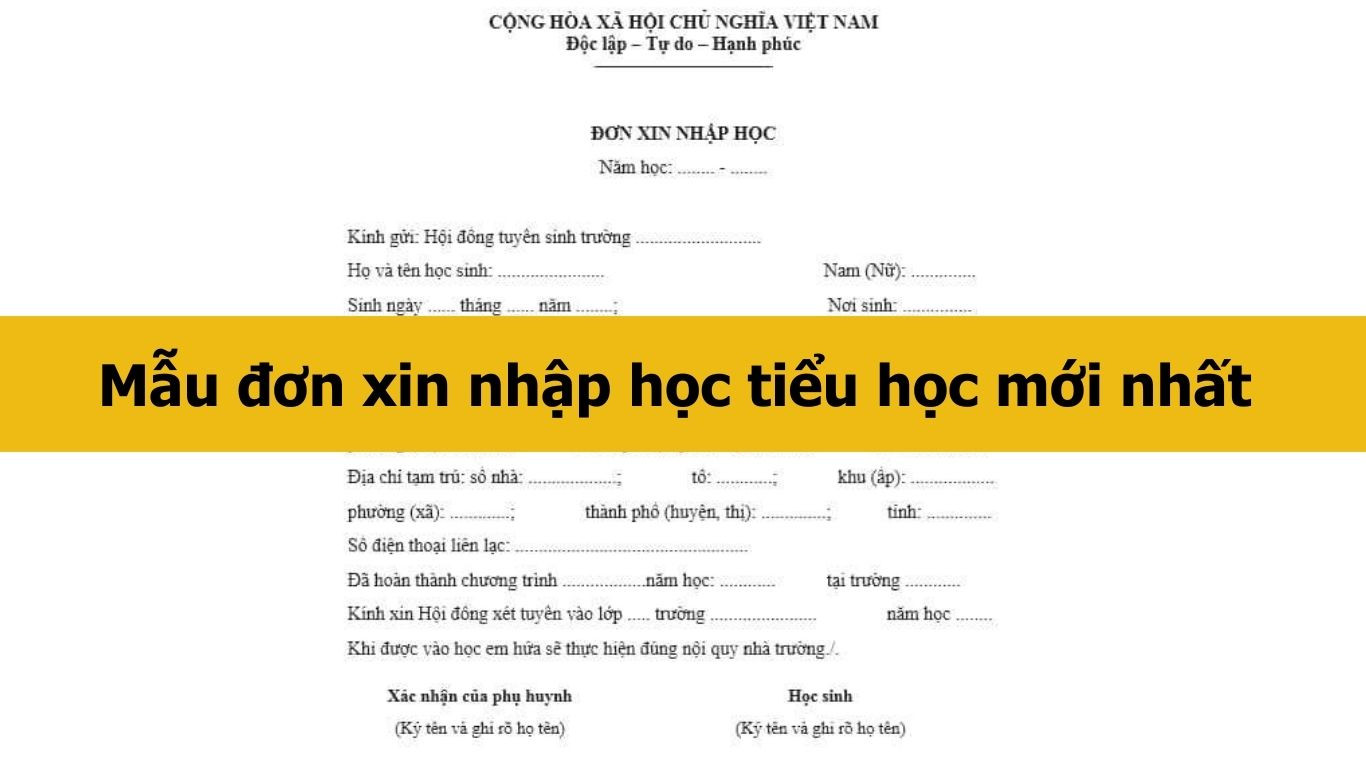
Mẫu đơn xin nhập học tiểu học mới nhất 2025
Hiện nay, để chuyển đổi cấp học tiểu học trong hệ thống giáo dục Việt Nam thì ngoài các tiêu chuẩn về trình độ, nhận thức còn có một thủ tục trước khi nhập vào cấp học này là phải có đơn xin nhập học. Nhiều phụ huynh còn phân vân chưa biết sử dụng mẫu đơn xin nhập học nào cho đúng. Qua bài viết này, chúng tôi sẽ giúp các bạn có được các mẫu đơn xin nhập học tiểu học mới nhất và cách viết phù hợp. 20/01/2025Mẫu đơn xin nhập học mầm non mới nhất 2025 và cách ghi chi tiết
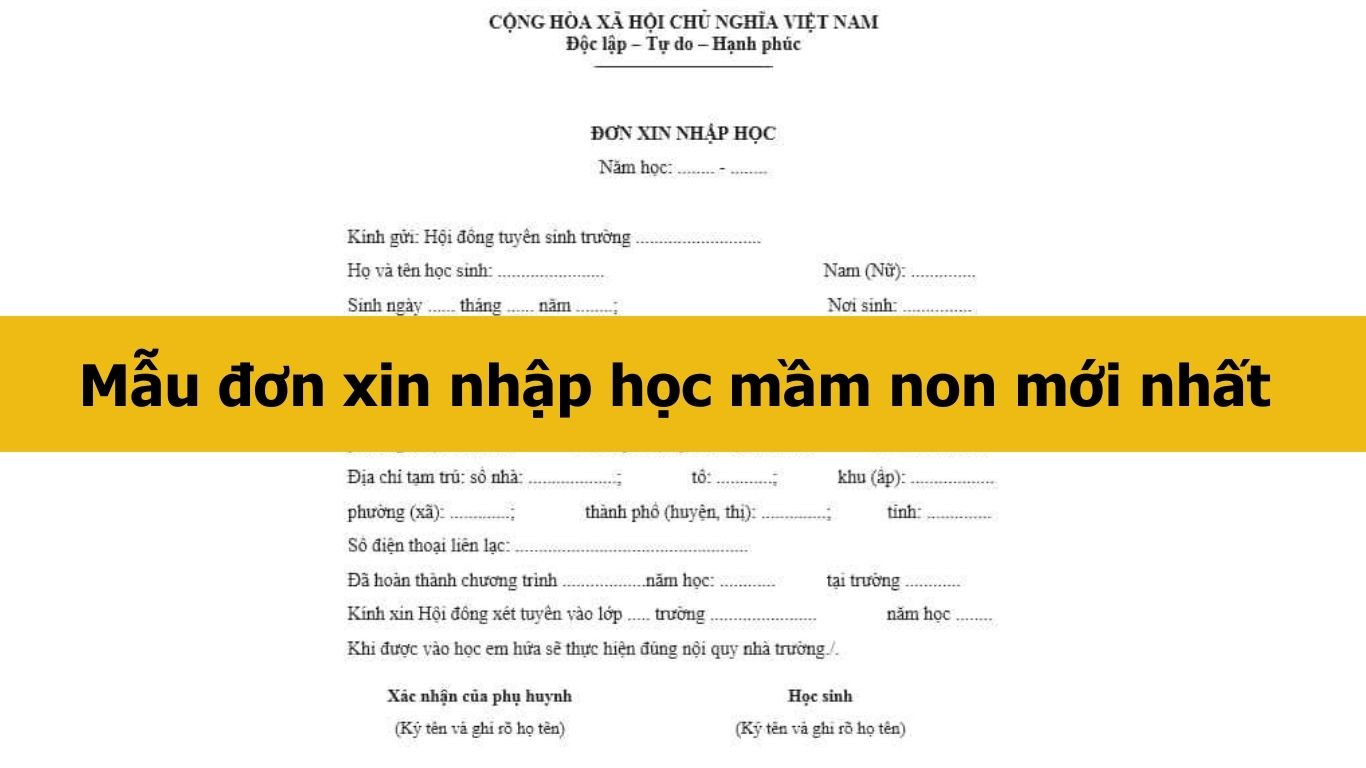
Mẫu đơn xin nhập học mầm non mới nhất 2025 và cách ghi chi tiết
Hiện nay, để chuyển đổi cấp học mầm non trong hệ thống giáo dục Việt Nam thì ngoài các tiêu chuẩn về trình độ, nhận thức còn có một thủ tục trước khi nhập vào cấp học này là phải có đơn xin nhập học. Nhiều phụ huynh còn phân vân chưa biết sử dụng mẫu đơn xin nhập học nào cho đúng. Qua bài viết này, chúng tôi sẽ giúp các bạn có được các mẫu đơn xin nhập học mầm non mới nhất và cách viết phù hợp. 20/01/202503 mẫu đơn xin nhập học mới nhất 2025 và hướng dẫn cách viết
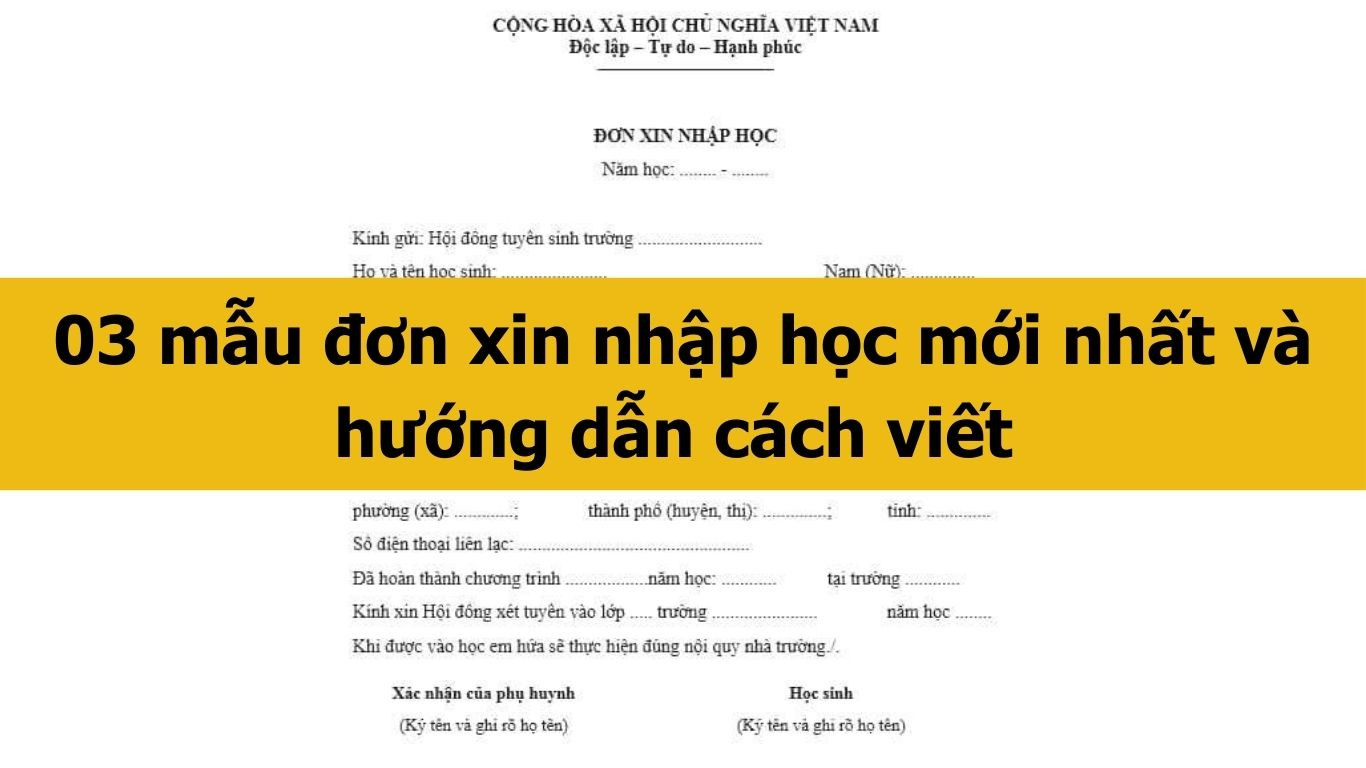
03 mẫu đơn xin nhập học mới nhất 2025 và hướng dẫn cách viết
Hiện nay, để chuyển đổi các cấp học trong hệ thống giáo dục Việt Nam thì ngoài các tiêu chuẩn về trình độ, nhận thức còn có một thủ tục trước khi nhập vào các cấp học là phải có đơn xin nhập học. Nhiều phụ huynh, học sinh còn phân vân chưa biết sử dụng mẫu đơn xin nhập học nào cho đúng. Qua bài viết này, chúng tôi sẽ giúp các bạn có được các mẫu đơn xin nhập học mới nhất và phù hợp. 20/01/2025Các hành vi bị nghiêm cấm với học sinh mới nhất 2025
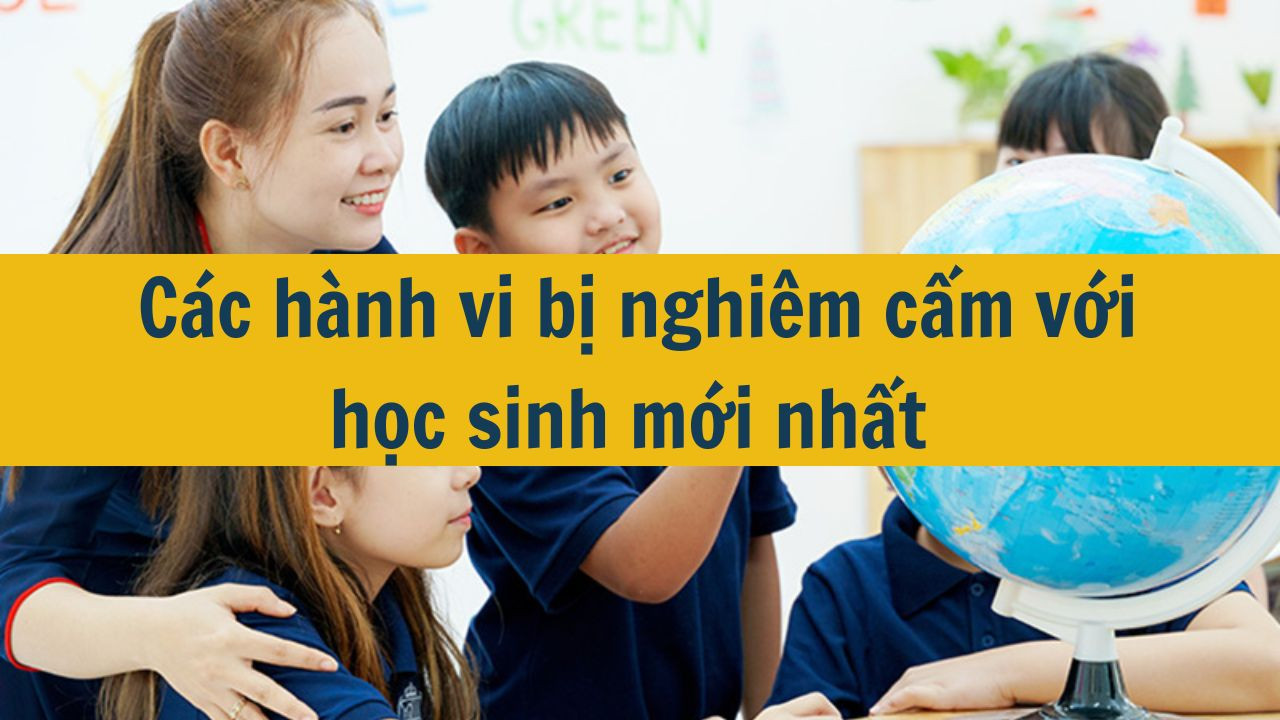
Các hành vi bị nghiêm cấm với học sinh mới nhất 2025
Bản cam kết học sinh được sử dụng phổ biến trong nhà trường, văn bản này giúp học sinh đặt ra các mục tiêu phấn đấu trong học tập để có động lực cố gắng. Các hành vi bị nghiêm cấm với học sinh mới nhất 2025. Bài viết sau đây sẽ làm rõ về các vấn đề này 14/01/2025Cách viết bản cam kết không tái phạm cho học sinh mới nhất 2025
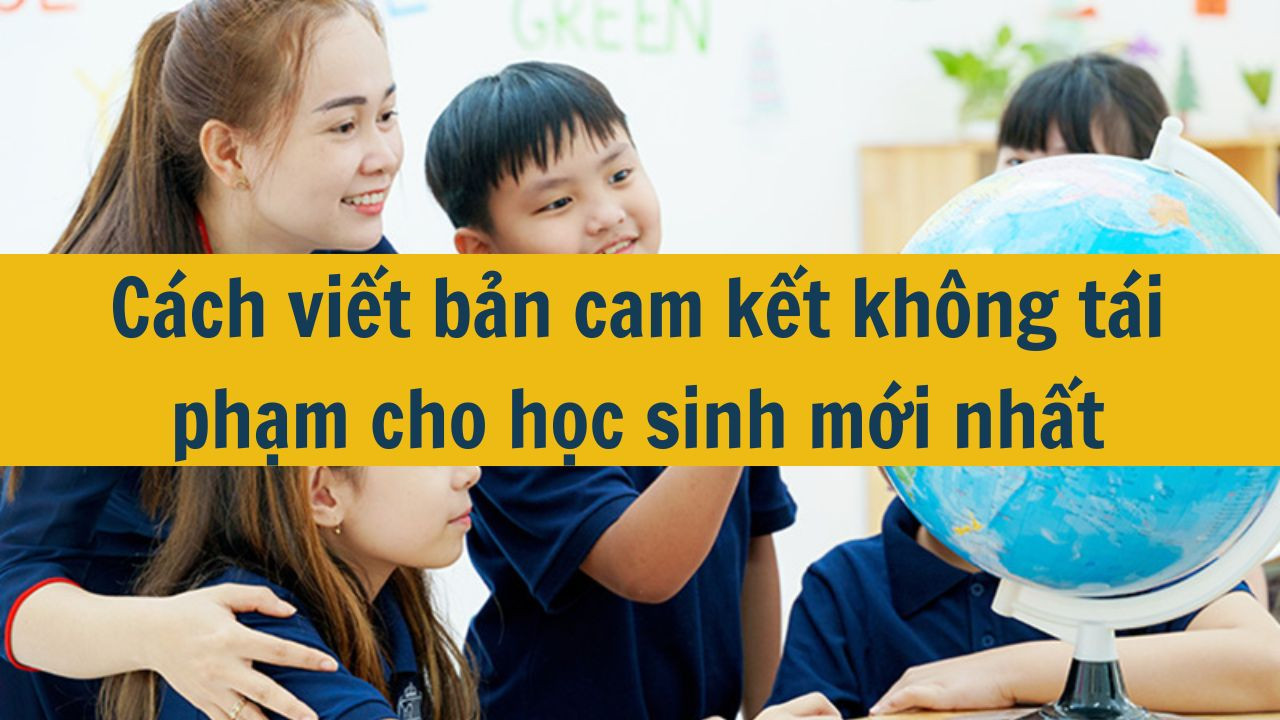
Cách viết bản cam kết không tái phạm cho học sinh mới nhất 2025
Bản cam kết học sinh được sử dụng phổ biến trong nhà trường, văn bản này giúp học sinh đặt ra các mục tiêu phấn đấu trong học tập để có động lực cố gắng. Vậy cách viết bản cam kết không tái phạm cho học sinh mới nhất 2025? Bài viết sau đây sẽ làm rõ về các vấn đề này. 14/01/202505 Mẫu bản cam kết của học sinh mới nhất 2025
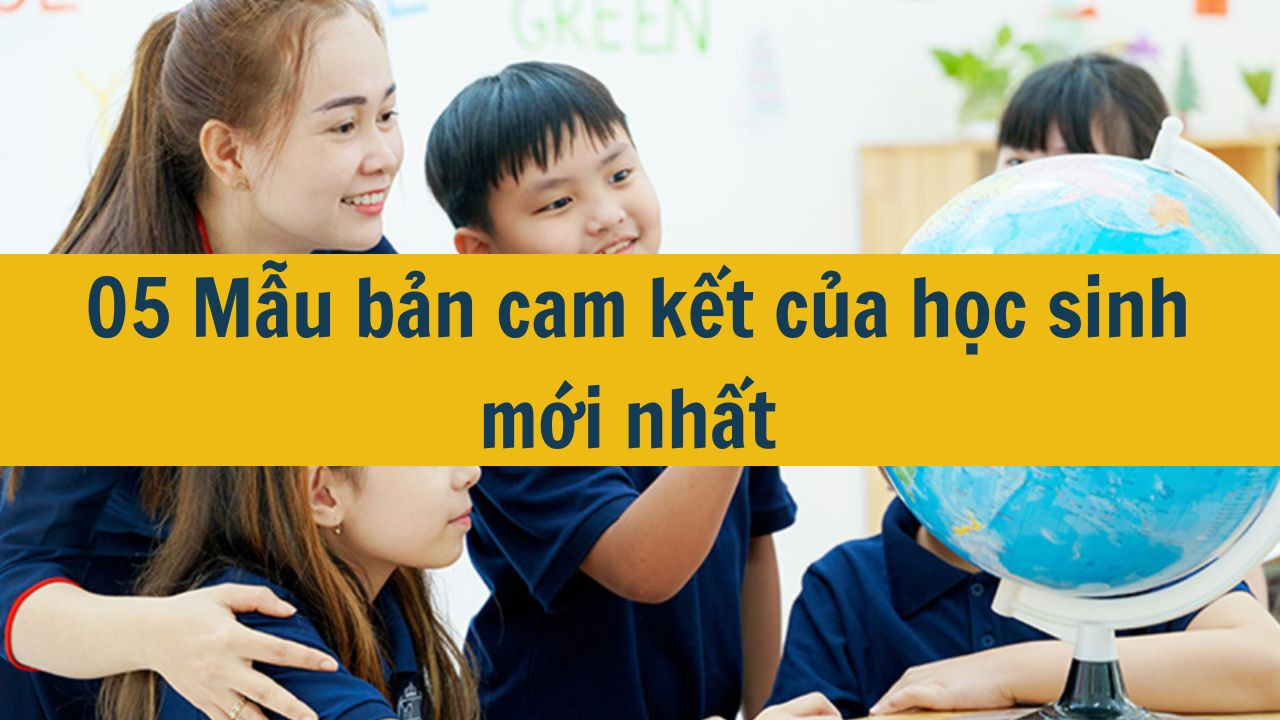
05 Mẫu bản cam kết của học sinh mới nhất 2025
Bản cam kết học sinh được sử dụng phổ biến trong nhà trường, văn bản này giúp học sinh đặt ra các mục tiêu phấn đấu trong học tập để có động lực cố gắng. 05 mẫu bản cam kết của học sinh mới nhất 2025. Bài viết sau đây sẽ làm rõ về các vấn đề này 11/01/2025Năm 2025 học giáo dục thường xuyên có bằng cấp 3 không? Bằng tốt nghiệp giáo dục thường xuyên có giá trị như bằng tốt nghiệp trung học phổ thông không?
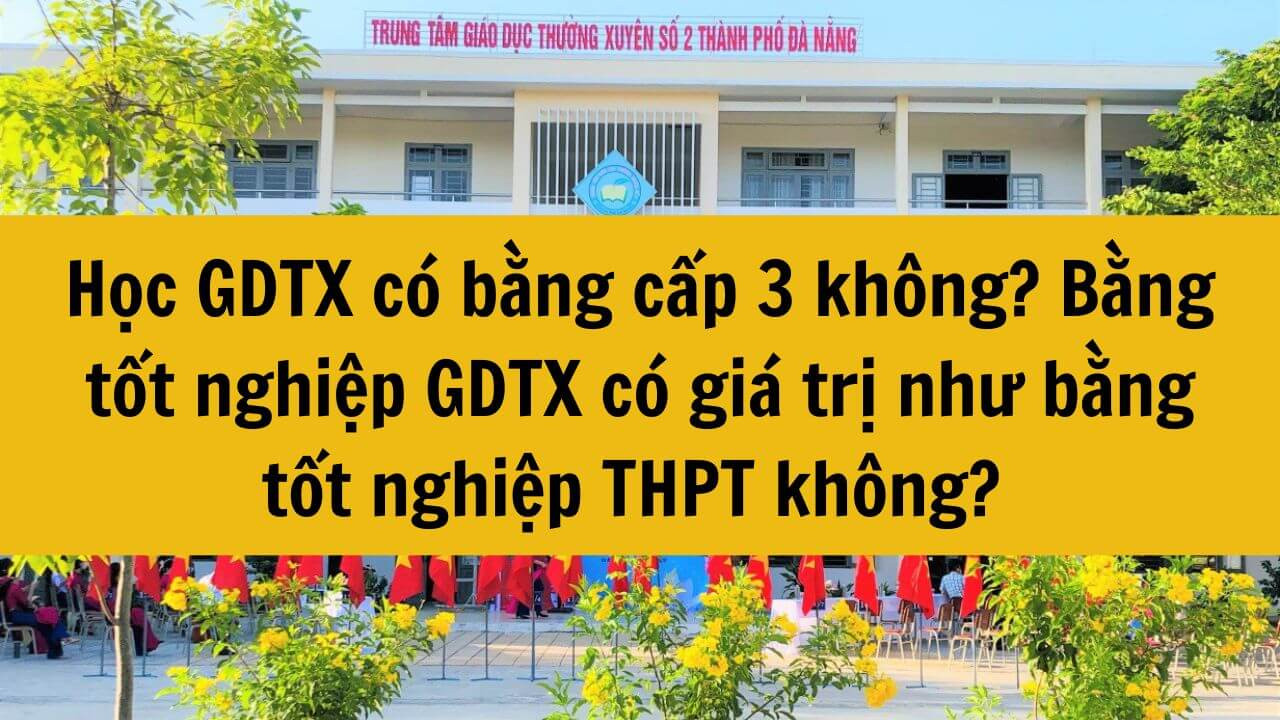

 Luật giáo dục 2019 (Bản Word)
Luật giáo dục 2019 (Bản Word)
 Luật giáo dục 2019 (Bản Pdf)
Luật giáo dục 2019 (Bản Pdf)